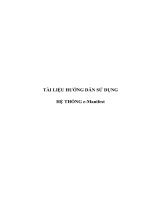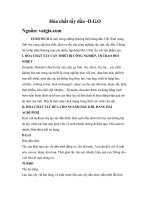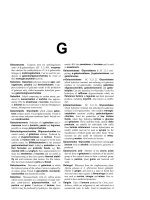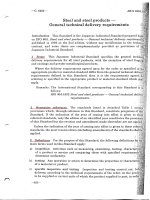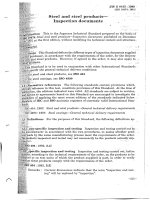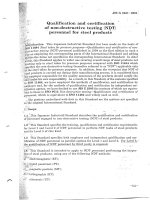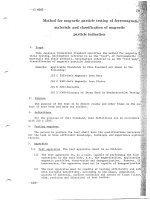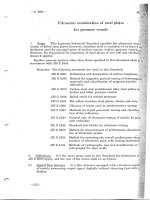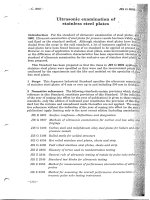Jis g 3137 1994
Bạn đang xem bản rút gọn của tài liệu. Xem và tải ngay bản đầy đủ của tài liệu tại đây (697.3 KB, 8 trang )
UDC
Translated
and
669.14.018.29-42:691.328.2
Published
by
Japanese
Standards
Printed
in Japan
Association
WMATA
AL
050928042267
5S
In the event of any doubt
the original Standard in Japanese
arising,
is to be final authority.
UDC 669. 14. 018. 29-42: 691. 328. 2
JAPANESE
Small
INDUSTRIAL
size-deformed
STANDARD
J 18
steel bars
G 3137-1994
for prestressed concrete
1.
Scope
This Japanese
Industrial
Standard
specifies
small
size-deformed
steel bars (hereafter referred to as "steel bar") intended for the use of prestressing of concrete.
Remarks
1.
bo
®
The standards cited in this Standard are given in the
following:
JIS G 0303
General
JIS G1214
Methods for determination of phosphorus in iron
and steel
JIS G 1215
Methods
JIS G1219
Methods for determination of copper in iron and
JIS G 1252
Emission-spectroscopic
and low alloy steel
JIS G 1253
Method for photoelectric emission spectrochemical analysis of iron and steel
JIS G 1256
Method for X-ray fluorescence spectrometric
JIS G 1257
Iron and steel — Methods for atomic absorption
spectrometric analysis
JIS Z 2201
Test pieces
JIS Z 2241
Method
of steel
for determination of sulfur in iron and
steel
analysis
of iron and
analysis for carbon steel
steel
for tensile test for metallic materials
of tensile test for metallic materials
The International standard corresponding to this Standard is
given in the following:
ISO 6934-3:
2.
steel
rules for inspection
1991
Steel for the prestressing of concrete —
Part 3: Quenched and tempered wire
Grade, symbol and designation
2.1
Grade and symbol
The steel bar shall be classified into 6 grades and
symbols thereof shall be as given in Table 1.
2
G 3137-1994
Grade
1.
Table
and
Symbol
Grade
Class 1
Grade C |
2.2
Designation
1
Class
D
Grade
1
Class
B
Grade
symbol
SBPDN
9380/1080
SBPDL
9380/1080
SBPDN
1080/1230
SBPDL
1080/1230
SBPDN
1275/1420
SBPDL
1275/1420
The designation of the steel bar shall be as given in Table 2.
Table 2.
Designation
Designation
10.7 mm
9.0 mm
7.1mm
12.6 mm
The phosphorus, sulphur and copper deemed as
Chemical composition
3.
impure element in the chemical composition of the steel bar shall be tested in
accordance with 8.1, and the cast analysis values thereof shall be as given in
Table
3.
Table 3.
Chemical composition
Unit:
P
5
0.0380 max.
0.035
%
Cu
max.
0.30 max.
The mechanical properties of the steel bar shall be
Mechanical properties
4.
tested in accordance with 8.2, and the tested values shall conform to those in Table 4.
Table 4.
Symbol
SBPDN
930/1080 |
SBPDL
930/1080
Mechanical properties
Elongation
Relaxation
N/mm?
%
%
1080 min.
5 min.
4,0 max.
Yield
stress
Tensile
strength
N/mm?
930 min.
2.5 max.
SBPDN
1080/1230 | 1080 min.
SBPDL
1080/1230
SBPDN
1275/1420 |
SBPDL
1275/1420
1230 min.
5 min.
4.0 max.
2.5 max.
1275 min.
1420 min.
5 min.
4.0 max.
2.5 max.
ao
G 3137-1994
Remarks:
5.
The yield stress is given by the stress corresponding to 0.2 %
permanent elongation.
Configuration
and
dimensions
5.1
Configuration
The steel bar shall be in bar form or in coil form with
approximately round cross section, and it also shall have either uniform projec-
tions or indents
5.2
continuously
Dimensions
nominal
diameter,
The dimensions of the steel bar shall be expressed as the
and they
shall be as given in Table
ever, are not specified.
5.3
Nominal
or at a certain interval.
cross-sectional
area
The
steel bar shall be as given in Table 5.
Table
5.
Nominal
diameter
nominal
and
5.
The
tolerances, how-
cross-sectional
cross-sectional
area of the
area
of steel bar
Designation
5.4
30 mm
Straightness
7.
Method
8.
Test
Nominal cross
sectional area
mm?
7.1 mm
7.1
40.0
9.0 mm
9.0
64.0
10.7 mm
10.7
90.0
12.6 mm
12.6
125.0
The
in any 1 m length.
6.
Appearance
defects.
Nominal
diameter
mm
straightness
of the steel bar shall be not more
than
The steel bar shall be free from harmful flaws and other
of manufacture
The
steel bar shall be manufactured
from
killed
steels by hot-rolling followed by quenching and tempering. The deforming work is
applied during either hot-rolling or post process of hot-rolling.
8.1
Chemical analysis
8.1.1
General requirements for chemical analysis and sampling method of
specimen for analysis
The chemical composition of the steel product shall be
determined by cast analysis, and the general requirements for chemical analysis
and the sampling method of the specimen for analysis shall be as specified in 3.
of JIS G 0308.
8.1.2
Method for chemical analysis
The method for chemical analysis shall be
in accordance with any suitable one(s) of the following standards:
JIS G 1214, JIS G 1215, JIS G 1219, JIS G 1252, JIS G 1258, JIS G 1256,
JIS G 1257
4
G 3187-1994
8.2
Mechanical
test
The sampling method of the test piece
Sampling method of test piece
8.2.1
shall be in accordance with the following:
Each test piece for the tensile and straightness tests shall be taken from each
(1)
lot which consists of steel bars of the same heat, heat-treated in the same
conditions and designation, in accordance with Table 6.
Table
Product
form
For all
(3)
of test piece
Tensile strength, elongation
and straightness
Yield stress
| Take one test piece from one
pieces or its fraction.
pieces or its fraction.
Take one test piece from one
|Take one test piece from one
its fraction.
its fraction.
end of one steel coil arbitrarily | end of one steel coil arbitrarily
selected out of every 5 coils or | selected out of every 30 coils or
designation
Remarks:
method
end of one steel bar arbitrarily | end of one steel bar arbitrarily
selected out of every 6000
selected out of every 1000
designation
Coil
Sampling
Take one test piece from one
For all
Bar
(2)
Designation
6.
In the case of the steel bar which is cut to lengths from a steel coil,
the requirements on sampling method for steel coil shall be applied to
those for the original steel coil.
The test pieces to be used for tensile, yield stress and elongation tests shall
be No. 2 test piece specified in JIS Z 2201 with mutatis mutandis
disregarding the dimensions of the steel bar.
The test piece for relaxation test shall be taken from one end of one piece
or one coil of the steel bar selected arbitrarily when the material or manufacturing process
In addition,
is changed.
the test piece to be used for relaxation test shall be appro-
priate one in length which enables to carry out the test specified in 8.2.3.
8.2.2
Tensile test
The tensile test shall be as given in the following:
(1)
The tensile test method shall be as specified in JIS Z 2241.
(2)
The tensile strength is given by dividing the maximum load achieved
during the test by the nominal cross-sectional area (Table 5).
(3)
The yield stress is given by dividing the load corresponding to 0.2 %
permanent elongation by the nominal cross-sectional area (Table 5).
The gauge length for measurement of elongation shall be 8 times the
nominal diameter.
(4)
we
G 3187-1994
2.
8.2.8
Relaxationtest
For relaxation testing, the test piece shall be gripped at
positions with appropriate distance at ordinary temperature, applied with load
(movable load) obtained by multiplying the value equivalent to 70 % of the tensile
strength given in Table 4 by the nominal cross-sectional area at a loading rate of
200 + 50 N/mm?/min, stressed with the said load for 120 + 2 s, gripped for
ensuing 1000 h, maintaining the gripping distance as it is, then measure the
amount of decrease of the load. The relaxation value is the ratio of the amount
of
decrease of the load to the initial movable load expressed in percentage.
8.8
Measurement of straightness
For measurement of straightness, the test
piece shall be laid down without restriction as practically as possible to determine
the maximum
9.
arc depth in any
1 m length
of the chord.
Inspection
91
Inspection
The inspection
(1)
General requirements for inspection shall be as specified in JIS G 0303.
(2)
The
(3)
The mechanical properties shall conform to the requirements specified in 4.
(4)
The configuration and dimensions shall conform to the requirements
(5)
The appearance shall conform to the requirements specified in 6.
chemical
composition
shall be carried
shall conform
out as follows:
to the requirements
specified in 3.
specified in 5.
9.2
Reinspection
In the case where the test results relating to the initial
test piece fail to satisfy the requirements specified in 4., a retest may be made.
In this
or coil
pieces
tively,
case, one additional test piece shall be taken from the identical steel bar
from which initial test piece have sampled, and further two additional test
shall be taken from each one end of two other steel bars or coils, respecof the same lot specified in Table 6. As a result of retesting, when all
tested values
satisfy the requirements,
the said lot is acceptable,
and when
the
test result on any test piece does not meet the requirement, the test lot is not
acceptable.
10.
Marking
(1)
Symbol of grade
(2)
Designation
(3)
Quantity or mass
(4)
Identification number
traceable
by which
(5)
Manufacturer's
or identifying brand
on each bundle
The steel bar which has passed the inspection shall be marked
with the following items by suitable
name
means:
the manufacturing
process(es)
of product
is
11.
Report
The manufacturer shall submit to the purchaser an itemized
report which describes the symbol of grade, designation, quantity, mass, identification number by which the manufacturing process(es) of the product, mechanical
properties (yield stress, tensile strength and elongation) and chemical composition
(relating to phosphorus, sulphur and copper) are traceable.
G 3187-1994
Edition 1
Japanese
Text
Established by Minister of International Trade and Industry
Date of Establishment:
Date
of Public Notice
Investigated by:
1994-06-01
in Official Gazette:
1994-06-07
Japanese Industrial Standards Committee
Divisional
Council
on Iron and
Steel
This English translation is published by:
Japanese Standards Association
1-24, Akasaka 4, Minato-ku,
Tokyo 107 Japan
© JSA,
1994
Printed in Tokyo by
Hohbunsha Co., Ltd.
